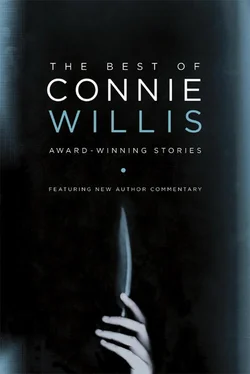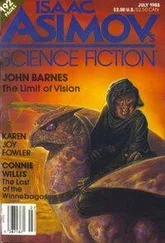The Amblers must have just beaten the workmen, though at the rate the men were working right now, leaning on their shovels in the hot afternoon sun and smoking stew, it had probably taken them six weeks to do this stretch.
Mesa was still open multiway, but as soon as I was through downtown, the construction started again, and this stretch was nearly done—forms up on both sides and most of the cement poured.
The Amblers couldn’t have come in from Globe on this road. The lanes were barely wide enough for the Hitori, and the tanker lanes were gated. Superstition is full-divided, and the old highway down from Roosevelt is, too, which meant they hadn’t come in from Globe at all. I wondered how they had come in—probably in some tanker lane on a multiway.
“Oh, my, the things we’ve seen,” Mrs. Ambler had said. I wondered how much they’d been able to see skittering across the dark desert like a couple of kangaroo mice, trying to beat the cameras.
The road workers didn’t have the new exit signs up yet, and I missed the exit for Apache Junction and had to go halfway to Superior, trapped in my narrow, cement-sided lane, till I hit a change-lanes and could get turned around.
Katie’s address was in Superstition Estates, a development pushed up as close to the base of Superstition Mountain as it could get. I thought about what I would say to Katie when I got there. I had said maybe ten sentences altogether to her, most of them shouted directions, in the two hours we had been together. In the jeep on the way to the vet’s I had talked to Aberfan, and after we got there, sitting in the waiting room, we hadn’t talked at all.
It occurred to me that I might not recognize her. I didn’t really remember what she looked like—only the sunburned nose and that terrible openness, and now, fifteen years later, it seemed unlikely that she would have either of them. The Arizona sun would have taken care of the first, and she had gotten married and divorced, been fired, had who knows what else happened to her in fifteen years to close her face. In which case, there had been no point in my driving all the way out here.
But Mrs. Ambler had had an almost impenetrable public face, and you could still catch her off guard. If you got her talking about the dogs. If she didn’t know she was being photographed.
Katie’s house was an old-style passive solar, with flat black panels on the roof. It looked presentable, but not compulsively neat. There wasn’t any grass—tankers won’t waste their credits coming this far out, and Apache Junction isn’t big enough to match the bribes and incentives of Phoenix or Tempe—but the front yard was laid out with alternating patches of black lava chips and prickly pear. The side yard had a parched-looking palo verde tree, and there was a cat tied to it. A little girl was playing under it with toy cars.
I took the eisenstadt out of the back and went up to the front door and rang the bell. At the last moment, when it was too late to change my mind, walk away, because she was already opening the screen door, it occurred to me that she might not recognize me, that I might have to tell her who I was.
Her nose wasn’t sunburned, and she had put on the weight a sixteen-year-old puts on to get to be thirty, but otherwise she looked the same as she had that day in front of my house. And her face hadn’t completely closed. I could tell, looking at her, that she recognized me and that she had known I was coming. She must have put a notify on her lifeline to have them warn her if I asked her whereabouts. I thought about what that meant.
She opened the screen door a little, the way I had to the Humane Society. “What do you want?” she said.
I had never seen her angry, not even when I turned on her at the vet’s. “I wanted to see you,” I said.
I had thought I might tell her I had run across her name while I was working on a story and wondered if it was the same person or that I was doing a piece on the last of the passive solars. “I saw a dead jackal on the road this morning,” I said.
“And you thought I killed it?” she said. She tried to shut the screen door.
I put out my hand without thinking, to stop her. “No,” I said.
I took my hand off the door. “No, of course I don’t think that. Can I come in? I just want to talk to you.”
The little girl had come over, clutching her toy cars to her pink T-shirt, and was standing off to the side, watching curiously.
“Come on inside, Jana,” Katie said, and opened the screen door a fraction wider. The little girl scooted through. “Go on in the kitchen,” she said. “I’ll fix you some Kool-Aid.” She looked up at me. “I used to have nightmares about your coming. I’d dream that I’d go to the door and there you’d be.”
“It’s really hot out here,” I said and knew I sounded like Hunter. “Can I come in?”
She opened the screen door all the way. “I’ve got to make my daughter something to drink,” she said, and led the way into the kitchen, the little girl dancing in front of her.
“What kind of Kool-Aid do you want?” Katie asked her, and she shouted, “Red!”
The kitchen counter faced the stove, refrigerator, and water cooler across a narrow aisle that opened out into an alcove with a table and chairs. I put the eisenstadt down on the table and then sat down myself so she wouldn’t suggest moving into another room.
Katie reached a plastic pitcher down from one of the shelves and stuck it under the water tank to fill it. Jana dumped her cars on the counter, clambered up beside them, and began opening the cupboard doors.
“How old’s your little girl?” I asked.
Katie got a wooden spoon out of the drawer next to the stove and brought it and the pitcher over to the table. “She’s four,” she said. “Did you find the Kool-Aid?” she asked the little girl.
“Yes,” the little girl said, but it wasn’t Kool-Aid. It was a pinkish cube she peeled a plastic wrapping off of. It fizzed and turned a thinnish red when she dropped it in the pitcher. Kool-Aid must have become extinct, too, along with Winnebagos and passive solar. Or else changed beyond recognition. Like the Humane Society.
Katie poured the red stuff into a glass with a cartoon whale on it.
“Is she your only one?” I asked.
“No, I have a little boy,” she said, but warily, as if she wasn’t sure she wanted to tell me, even though if I’d requested the lifeline I already had access to all this information. Jana asked if she could have a cookie and then took it and her Kool-Aid back down the hall and outside. I could hear the screen door slam.
Katie put the pitcher in the refrigerator and leaned against the kitchen counter, her arms folded across her chest. “What do you want?”
She was just out of range of the eisenstadt, her face in the shadow of the narrow aisle.
“There was a dead jackal on the road this morning,” I said. I kept my voice low so she would lean forward into the light to try and hear me. “It’d been hit by a car, and it was lying funny, at an angle. It looked like a dog. I wanted to talk to somebody who remembered Aberfan, somebody who knew him.”
“I didn’t know him,” she said. “I only killed him, remember? That’s why you did this, isn’t it, because I killed Aberfan?”
She didn’t look at the eisenstadt, hadn’t even glanced at it when I set it on the table, but I wondered suddenly if she knew what I was up to. She was still carefully out of range.
And what if I said to her, “That’s right. That’s why I did this, because you killed him, and I didn’t have any pictures of him. You owe me. If I can’t have a picture of Aberfan, you at least owe me a picture of you remembering him.”
Only she didn’t remember him, didn’t know anything about him except what she had seen on the way to the vet’s, Aberfan lying on my lap and looking up at me, already dying. I had had no business coming here, dredging all this up again. No business.
Читать дальше












